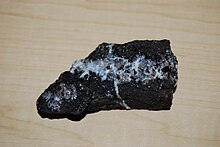Stilpnomelane
Appearance
| Stilpnomelane | |
|---|---|
 Stilpnomelane with quartz, collected from a road cut near Laytonville, California | |
| General | |
| Category | Phyllosilicates Smectite group |
| Formula (repeating unit) | K(Fe2+,Mg,Fe3+)8 (Si,Al)12(O,OH)27·n(H2O) |
| Strunz classification | 9.EG.40 |
| Crystal system | Triclinic |
| Crystal class | Pinacoidal (1) (same H-M symbol) |
| Space group | P1 |
| Unit cell | a = 21.72 Å, b = 21.72 Å c = 17.4 Å; α = 124.14° β = 95.86°, γ = 120°; Z = 6 |
| Identification | |
| Color | Black, greenish black, yellowish bronze, greenish bronze |
| Crystal habit | Platey, scaly and fibrous with comb structures; radiating groups |
| Cleavage | Perfect on {001}, imperfect on {010} |
| Tenacity | Brittle |
| Mohs scale hardness | 3 - 4 |
| Luster | Vitreous to dull |
| Streak | Gray white |
| Diaphaneity | Subtranslucent to opaque |
| Specific gravity | 2.77 - 2.96 |
| Optical properties | Biaxial (-) |
| Refractive index | nα = 1.543 - 1.634 nβ = 1.576 - 1.745 nγ = 1.576 - 1.745 |
| Birefringence | δ = 0.033 - 0.111 |
| Pleochroism | X: bright golden yellow to pale yellow Y and Z: deep reddish brown, to deep green to nearly black |
| 2V angle | 0-40 measured |
| Dispersion | None |
| References | [1][2][3] |
Stilpnomelane is a phyllosilicate mineral. It has the formula K(Fe2+,Mg,Fe3+)8(Si,Al)12(O,OH)27·n(H2O).[3]
Stilpnomelane occurs associated with banded iron formations. It is a metamorphic mineral associated with the blueschist and greenschist facies.[1]
It was first described in 1827 for an occurrence in Moravia in the Czech Republic. The name is derived from the Greek stilpnos for shining, and melanos for black.[2]
